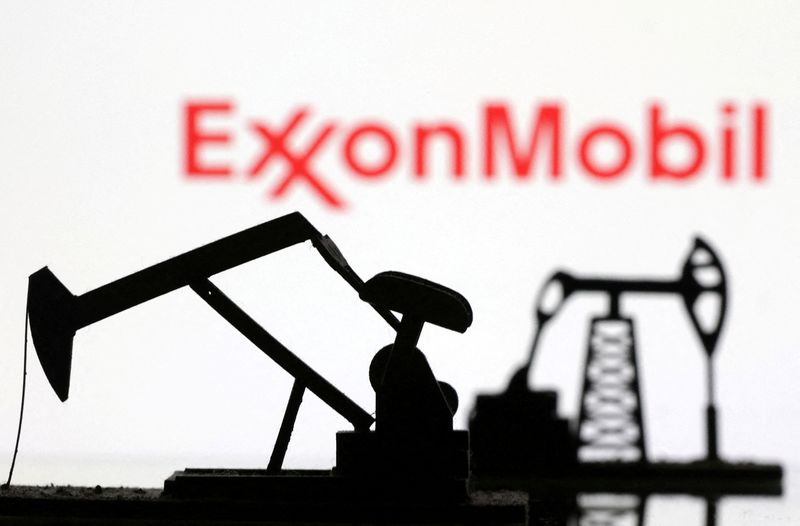
By Sabrina Valle
(Reuters) – Exxon Mobil (NYSE:XOM) on Friday posted a better-than-expected $9.2 billion second-quarter profit based on rising output from its purchase this year of shale oil firm Pioneer Natural Resources (NYSE:PXD).
Exxon delivered a $2.14 a share profit that beat analysts’ estimates on oil production and pricing gains that offset refining weakness. Results mirrored profit beats by rivals BP (NYSE:BP), Shell (LON:SHEL) and ConocoPhillips (NYSE:COP).
Higher profit “was driven by record production both in Guyana and in the Permian,” which offset lower natural gas and fuel prices, Chief Financial Officer Kathryn Mikells said.
Net income was $9.24 billion, up from $7.88 billion a year ago.
The boost from the Pioneer purchase, which brought on mainly production from the U.S. Permian Basin, highlighted how quickly Exxon was able complete the deal compared to their rivals. Chevron (NYSE:CVX) and ConocoPhilips are still waiting to complete regulatory reviews of their pending deals, with Chevron suggesting this week the close of its purchase of Hess (NYSE:HES) may not happen until the second half of next year.
Exxon, a partner with Hess in Guyana, has challenged that deal and its arbitration claim should be resolved by September 2025, Mikells told Reuters in an interview.
The top U.S. oil producer raised its 2024 output target by 13% to 4.3 million barrels of oil equivalent per day (boepd) following the pioneer deal, Mikells said. Exxon produced 3.74 million boepd in 2023.
Results from Pioneer were consistent with expectations, despite one-off expenses associated with the transaction, the CFO said.
“We already see a line of sight of greater synergies” than expected when Exxon announced the transaction, Mikells said, adding that any updates will be disclosed in December.
Expenses rose modestly in the quarter with capital spending of $7.03 billion, including $700 million in spending on assets acquired from Pioneer, up from $6.17 billion in the same quarter a year ago.
Exxon increased its annual capital expenditures guidance to $28 billion, higher than its previously announced $23 billion to $25 billion.
The results also showed higher cash flow from operations which will fund higher share buybacks and dividends. Cash flow from operations climbed to $10.5 billion, from $9.4 billion a year ago.
The company plans to buy back $19 billion in shares this year, the highest share repurchase program among its top Western rivals, up from $17.4 billion last year.
Oil and gas production in the second quarter grew by 15% from the previous quarter, or 574,000 boepd, including the added Pioneer contribution. Exxon had anticipated that Pioneer would add between 500,000-550,000 boepd of output in the quarter.

Its Guyana operations, which were expected to produce about 600,000 boepd this year with partners, posted peak production in May, with a record of 663,000 boepd.
The company plans to deliver cumulative savings of $5 billion through the end of 2027 versus 2023, including $1 billion in cost cuts during the second quarter.
This post is originally published on INVESTING.



